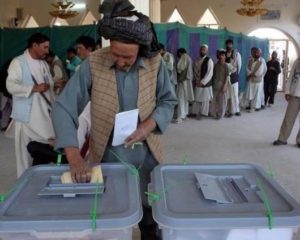
by Ahmadullah Archiwal 24/1/20189
If elections are meant to earn legitimacy through the representation of a particular populace, then higher is the turnout in an election greater will be the legitimacy of a regime and vice versa. The questions of representation and regime legitimacy are mainly addressed through elections in the post-2001 Afghanistan. Though the course was bumpy at times, it is still the most popular way of demonstration of their political will by ordinary Afghans. However, reducing the role of elections only to a method of expressing their political will by Afghans undermines the enormous role that the polls can play in the stability in Afghanistan. If properly conducted, elections have the potential to end the marginalization of the population and strengthen order and extend government’s writ in the country.
Technically, the existing electoral system is not responsive to the ground realities in Afghanistan. It excludes a huge number of people from expressing their will and forces them to develop feelings of being marginalized. The focus of this discussion is mainly parliamentary elections, never the less it also covers provincial councils and district council elections.
The whole province is a constituency in the parliamentary as well as in the provincial council elections according to the existing system.
Under the current system, candidates for the provincial council and National Assembly are subject to undergoing competition throughout the province. Candidates whose constituents are limited or whose area of influence is home to insurgency fail to compete with candidates from the relatively secure areas, and thus they fail in elections. This practice has pushed a large number of social, religious and ethnic groups to marginalization in many parts of the country.
Additionally, electorates in the existing electoral system, though vote for their favorite candidate they lose track of their parliamentarian after they are elected. Since every parliamentarian represents their respective province and the geographical and security limitations overshadow their reach to the whole province, they also lose track of their electorates. This foggy situation creates a web of intricacies that creates distances between the parliamentarians and their constituents. The situation creates a sense of marginalization among the general public, particularly among those who don’t have means to stay connected to their parliamentarians.
More importantly, the existing system paves the way for candidates mainly from the urban centers to win elections while the candidate who represents areas that are home to insurgency cannot win in the elections. Although a direct correlation between insurgency and underrepresentation is a bit difficult to establish the previous elections are a manifestation of a correlation between the two.Areas that are home to insurgency are the areas that don’t have representations in the National Assembly. Shinwari and Khugyani districts in Nangarhar, Zadran in Loya Paktia(Paktia, Paktika, and Khost) and some districts in Ghazni emblem the fact. Nangrahar is home to six districts of Shinwari tribe but has only one Member of Parliament in the National Assembly, Khogyani live in three districts in Nangarhar but has no member in the National Assembly. Zadran lives in ten districts of Loya Paktia but has no representation in the National Assembly. All the stated districts are home to insurgency and are relatively insecure than other districts in their respective provinces.
The nature of the ongoing insurgency is such that it needs to be neutralized on the village level, where it starts. Military standpoint reinforces the fact that hearts and minds must be won on the village level to defeat the insurgency in its infancy, failure to do so will spread insurgency to cities and urban centers.
To conclude, deprivation of the volatile areas’ residents means pushing them to further exclusion and vice-versa. Giving residents of the volatile areas an opportunity to express their political will shall strengthen their sense of being part of the system, and this will improve the security situation across the country. Citizens in such areas will see themselves in the system and will help the government extend its writ to different parts of the country.
However, for the Afghan government to achieve the above ideal, it needs to revisit the existing electoral system and replace the current electoral system with the single-member system. The existing electoral system was designed for a period when the country was newly experiencing democracy and taking baby steps towards a more representative system. The current situation calls for a system that ensures more inclusivity.
To close, single-member districts in parliamentary and provincial councils’ elections will trigger greater representation throughout Afghanistan that in turn will result in greater stability and enhanced state writ in Afghanistan.
